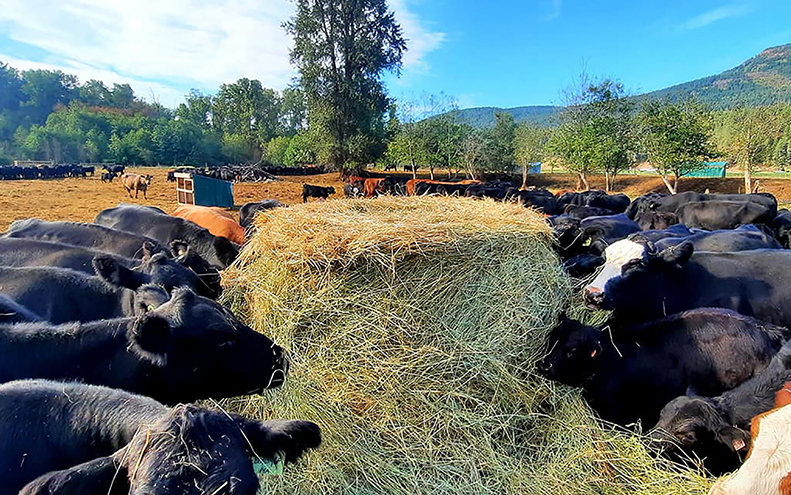WESTWOLD — The Salmon River watershed is a complex ecosystem. A variety of water use interests, long-term environmental impacts and minimal mitigation efforts make the river problematic.
A key issue is the river’s importance as a salmon-bearing stream, which makes it especially vulnerable to regulations designed to protect aquatic life.
But the watershed is also the sole water source for scores of agricultural users, including dairy, beef and forage operations as well as smaller mixed farms and residences. Salmon Lake, off Douglas Lake Road, is one of the origins of the river but there is no dam to control outflows.
Another concern is forest management. The entire region has been impacted by logging as well as the White Rock Lake wildfire in 2021, resulting in reduced upland water-holding capacity and much larger and more intense spring freshets.
The combination of issues isn’t unique to the Salmon River, but they’ve come to a head here with particular intensity over the past three years. Ranchers and farmers are especially concerned at the apparent lack of research presented to justify a curtailment order delivered to forage operations in the lower Salmon River watershed on August 15.
The order, as well as a follow up press release from the BC Ministry of Forests, claimed the decision to restrict irrigation was “science-based.” Streamflows had fallen below 1,270 litres per second, according to the order, and action was needed to protect fish populations.
The decision was in line with reports dating back to the 1970s which said low streamflow thresholds were key to protecting the local salmon run here, as in other sensitive watersheds around the province.
But the province failed to respond to multiple requests from water licensees for a meeting to review the decision, which would have given farmers an opportunity to understand the underlying science. Instead, messaging from the province thanked them for taking steps to reduce water use and defer the curtailment order, which was presented as a last resort to save the fish.
Yet a 110-page report on the conditions, trends and issues completed for the Salmon River Watershed Roundtable in 1995 provided a thorough overview of the problems and made a number of recommendations.
Of chief importance was a study of the “water budget,” the key supply and demand levels for the watershed as well as the relationships between surface water, groundwater, the region’s aquifers, adjacent wetlands and the likelihood of some valley water draining south toward the Okanagan. Groundwater licensing, regulation and user fees, were also recommended.
The report recommended exploring additional water storage capacity, as well as water conservation. The protection and restoration of salmon habitat was also recommended.
One recommendation from the 1995 report was partially carried out.
“My husband was contracted to work on riverbank restoration,” says Westwold rancher Trudy Schweb. “He helped to install rip-rap and plant shade trees along the river banks, but the funding ran out and the project was never completed.”
BC Cattlemen’s Association general manger Kevin Boon says his organization has been discussing headwater control with government for years.
“What I don’t understand is the lack of involvement from DFO,” he says. “They are responsible for salmon. Why are they not investing in mitigation projects?”
Irrigation technology has improved significantly and many hay fields along the valley are watered by the latest pivot systems, but they are expensive.
“We would love to buy a pivot system but it is not within our budget right now,” says Schweb.
While the province introduced a $20 million agricultural water infrastructure program to assist producers expand water storage and undertake irrigation improvements, it was quickly oversubscribed.
Some producers have criticized the program for requiring costly studies that both complicate and double the cost of improvements. For her part, Schweb thinks the money would be better spent developing headwater storage that could help control spring flows and release water later in the season to support spawning salmon.
Regardless of where money is spent, none of the solutions are going to be cheap.
“There is a huge investment needed in water management and infrastructure for both food security and management of all of our other needs including fish,” says Boon, noting that irrigation is crucial to forage producers, who must water fields immediately following a cut in order to foster the next crop.
“It’s like starting a new lawn, the grass needs to be watered immediately,” he says.
Boon believes a local watershed council would help bring all sides to the table to develop a comprehensive plan for the management of the watershed. Similar work is underway in the Koksilah and has been recommended for the Tsolum, both of which were also subject to curtailment orders this summer.
“[Build] a plan for required storage and management to insure that there is adequate water available when it is needed for fish habitat that is not reliant on or detrimental to the investment that has been made by agriculture,” Boon says.
It would also go a long way to addressing the lack of communication that’s met the concerns of Westwold producers this year. Rather than sending natural resource officers in bulletproof vests to ticket and fine frustrated farmers, listening to their concerns and providing a direct response would go a long way towards garnering community support.
“It’s been more than a month. If they would just meet with us, I know we could come up with some ideas to support both the farmers and the salmon,” Schweb says.


 Okanagan egg producers chosen
Okanagan egg producers chosen